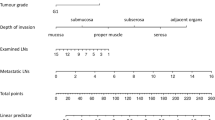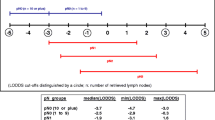Abstract
Background
Inadequate sampling of lymph nodes could lead to stage migration and indicate a poor prognosis for gastric cancer after curative surgery. Some emerging novel predictors and the application of a nomogram could increase the accuracy of survival prediction.
Methods
An international database regarding gastric cancer was employed as the primary cohort. The patients with inadequate (< 30) lymph nodes (LN) were analyzed by Cox proportional hazards regression. Based on the selected model, a nomogram was plotted and calibrated against an external validation database.
Results
A total of 1109 patients were included in the primary cohort, and there were 6584 patients in the validation cohort. There were significant differences regarding the clinical characteristics between the two cohorts. The model containing age, T stages, N stages, metastatic lymph nodes (mLN), and the number of total LN retrieved (TLN) showed superiority over the conventional TNM stages. Harrell's concordance index of the nomogram and TNM stages was 0.744 and 0.717, respectively. The external validation demonstrated a good concordance with the nomogram-predicted survival.
Conclusions
The nomogram including age, T stages, N stages, mLN, and TLN had a better accuracy than the conventional TNM staging system in predicting overall survival for gastric cancer patients with inadequate (< 30) LN.



Similar content being viewed by others
References
Bray F, Ferlay J, Soerjomataram I et al (2018) Global cancer statistics 2018: GLOBOCAN estimates of incidence and mortality worldwide for 36 cancers in 185 countries. CA Cancer J Clin 68:394–424
Songun I, Putter H, Kranenbarg EM-K et al (2010) Surgical treatment of gastric cancer: 15-year follow-up results of the randomised nationwide Dutch D1D2 trial. Lancet Oncol 11:439–449
Morgan JW, Ji L, Friedman G et al (2015) The role of the cancer center when using lymph node count as a quality measure for gastric cancer surgery. JAMA Surg 150:37–43
Gholami S, Janson L, Worhunsky DJ et al (2015) Number of Lymph Nodes Removed and Survival after Gastric Cancer Resection: An Analysis from the US Gastric Cancer Collaborative. J Am Coll Surg 221:291–299
Datta J, Lewis RS, Mamtani R et al (2014) Implications of inadequate lymph node staging in resectable gastric cancer: a contemporary analysis using the National Cancer Data Base. Cancer 120:2855–2865
Amin MB, Edge S, Greene F, et al. AJCC Cancer staging Manual[M]. 8th ed. Springer,2016.
Li B, Li Y, Wang W, et al (2016) Incorporation of N0 Stage with Insufficient Numbers of Lymph Nodes into N1 Stage in the Seventh Edition of the TNM Classification Improves Prediction of Prognosis in Gastric Cancer: Results of a Single-Institution Study of 1258 Chinese Patients. Ann Surg Oncol 23:142–148.
Sun Z, Zhu G-L, Lu C et al (2009) The impact of N-ratio in minimizing stage migration phenomenon in gastric cancer patients with insufficient number or level of lymph node retrieved: results from a Chinese mono-institutional study in 2159 patients. Ann Oncol 20:897–905
Yamashita H, Deng J, Liang H et al (2017) Re-evaluating the prognostic validity of the negative to positive lymph node ratio in node-positive gastric cancer patients. Surgery 161:1588–1596
Jian-Hui C, Shi-Rong C, Hui W et al (2016) Prognostic value of three different lymph node staging systems in the survival of patients with gastric cancer following D2 lymphadenectomy. Tumour Biol 37:11105–11113
Spolverato G, Ejaz A, Kim Y et al (2015) Prognostic performance of different lymph node staging systems after curative intent resection for gastric adenocarcinoma. Ann Surg 262:991–998
Smith DD, Nelson RA, Schwarz RE (2014) A comparison of five competing lymph node staging schemes in a cohort of resectable gastric cancer patients. Ann Surg Oncol 21:875–882
Lu J, Huang C, Zheng C et al (2013) Consideration of tumor size improves the accuracy of TNM predictions in patients with gastric cancer after curative gastrectomy. Surg Oncol 22:167–171
Ohashi T, Komatsu S, Ichikawa D et al (2016) Tumor index as a combined indicator of tumor depth and size in gastric cancer. Anticancer Res 36:1895–1900
Zhang Z, Kattan MW (2017) Drawing Nomograms with R: applications to categorical outcome and survival data. Ann Transl Med 5:211
Ji X, Bu Z-D, Yan Y, et al (2018) The 8th edition of the American Joint Committee on Cancer tumor-node-metastasis staging system for gastric cancer is superior to the 7th edition: results from a Chinese mono-institutional study of 1663 patients. Gastric Cancer 21:643–652.
Liu Y-Y, Fang W-L, Wang F et al (2017) Does a higher cutoff value of lymph node retrieval substantially improve survival in patients with advanced gastric cancer?-time to embrace a new digit. Oncologist 22:97–106
Woo Y, Goldner B, Ituarte P et al (2017) Lymphadenectomy with optimum of 29 lymph nodes retrieved associated with improved survival in advanced gastric cancer: a 25,000-patient international database study. J Am Coll Surg 224:546–555
Hayashi S, Kanda M, Ito S, et al (2018) Number of retrieved lymph nodes is an independent prognostic factor after total gastrectomy for patients with stage III gastric cancer: propensity score matching analysis of a multi-institution dataset. Gastric Cancer.
Han D-S, Suh Y-S, Kong S-H et al (2012) Nomogram predicting long-term survival after d2 gastrectomy for gastric cancer. J Clin Oncol 30:3834–3840
Song KY, Park YG, Jeon HM et al (2014) A nomogram for predicting individual survival of patients with gastric cancer who underwent radical surgery with extended lymph node dissection. Gastric Cancer 17:287–293
Acknowledgements
We thank the IMIGASTRIC program for its contribution in promoting the collaborative work between Peking University Cancer Hospital and St. Mary’s Hospital.
Funding
No funding supported this study.
Author information
Authors and Affiliations
Corresponding authors
Ethics declarations
Conflict of interest
The authors declare that they have no conflict of interest.
Additional information
Publisher's Note
Springer Nature remains neutral with regard to jurisdictional claims in published maps and institutional affiliations.
About this article
Cite this article
Li, S., Desiderio, J., Li, Z. et al. The development and external validation of a nomogram predicting overall survival of gastric cancer patients with inadequate lymph nodes based on an international database. Int J Clin Oncol 26, 867–874 (2021). https://doi.org/10.1007/s10147-021-01875-2
Received:
Accepted:
Published:
Issue Date:
DOI: https://doi.org/10.1007/s10147-021-01875-2




